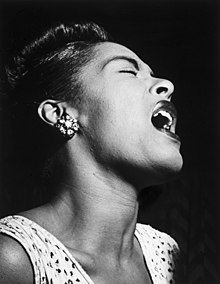
Ella Fitzgerald by Carl Van Vechten. Source: Beinecke Library, Yale University
Ella Fitzgerald died twenty years ago today. She was the most versatile singer of the 20th century, a vocal virtuoso with perfect pitch. Her band reportedly tuned up their instruments to the sound of her voice. Ella Fitzgerald expressed the pantheon of human emotion with a clarity so acute she became the voice of postwar America and "the First Lady of Song." She was a flawless vocal tactician with the range of an orchestra. Fitzgerald could make her voice sound like the blaring of a trumpet, the plinking of piano keys, or the tsk of the high hat.
Every song she sang became an absolute truth. In Summertime, when she sang "your father is rich and your mother is good looking," that lyric became a statement of fact.
Her contemporaries had immense strengths as singers, but Fitzgerald was able to combine all their best traits and create magic. She had Dinah Washington's emotional heft and smoothness, Carmen McRae's gift of interpretation, and Nancy Wilson's light touch with a lyric. Ms. Fitzgerald sang with an enchanting confidence and easy manner. Tony Bennett still works in her style, sauntering through the world of Pop deploying a charm out of time with the unearned hauteur required of contemporary singers.
Ella Fitzgerald was always the coolest person on stage. When she performed duets with Louis Armstrong, Frank Sinatra and Dean Martin, men known for their easy banter and confidence, they had to work up to her level of nonchalance.
Ms. Fitzgerald has been gone for twenty years, but her legendary voice is still here, a mesmerizing delight.



